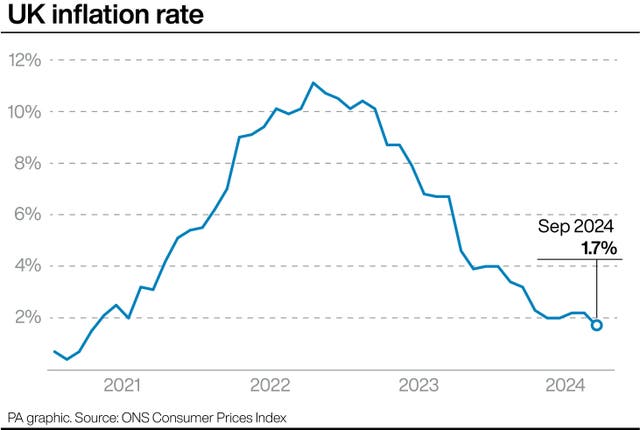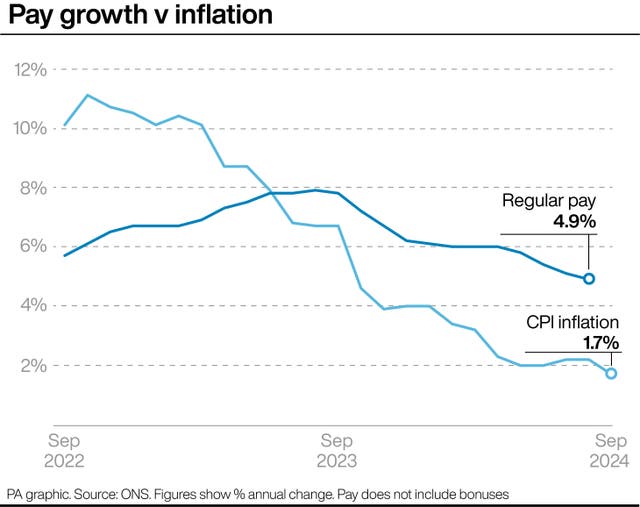Inflation in the UK decreased last month to 1.7%, according to official data.
It was the lowest reading since April 2021 and came in below the 2% target rate for inflation set by the Bank of England and UK Government.
Here the PA news agency looks at what the latest inflation data means for households and the economy.
– What is inflation?
Inflation is the term used to describe the rising price of goods and services.
September’s inflation rate of 1.7% means that if an item cost £100 a year ago, the same thing would now cost £101.70.
It is lower than the 2.2% inflation rate recorded in August, meaning that prices are increasing more slowly than they previously were.
– Does this mean the cost of living has fallen?
No, the cost of living is still rising, just at a much slower rate than it has in recent years.
In fact, just two years ago, prices were soaring by up to 11.1%, largely because of significantly higher gas and electricity costs.

Prices for UK households are still significantly higher than before the recent rise and fall in inflation.
– Is inflation falling for everything?
The latest figures showed that many areas of the economy have seen easing inflation, but not everything.
In fact, price rises for food and non-alcoholic drinks increased last month.
Food and drink inflation rose to 1.9% from 1.3% in August, amid increases in the price of eggs, milk and cheese.
– What made inflation go down?
The ONS said the reduction in inflation was partly caused by a fall in fuel prices.
CPI rose by 1.7% in the 12 months to September 2024, down from 2.2% in August 2024.
Read the release ➡️ https://t.co/VlulVDztIW pic.twitter.com/iv83ietkiz
— Office for National Statistics (ONS) (@ONS) October 16, 2024
It said motor fuels and lubricant prices were down 10.4% in September, compared with the same month a year earlier, due to a fall in the price of petrol year-on-year.
Meanwhile, there was also a contribution from lower air travel costs, as cheaper air fares due to post-summer sales helped drive a 5% fall in the category.
– Will the cost of living itself ever fall?
The Government does not want prices to fall. It sets the Bank of England, the UK’s central bank, a target to keep the inflation rate at 2%.
It says this is the ideal level to help people and businesses plan their spending.
Nevertheless, some items are cheaper than they were a year earlier, such as bread, cereals and fish.
– Is inflation expected to stay low?
In May, the rate of inflation fell to the 2% target rate and has stayed close to this in recent months despite some slight fluctuation.

Economists at EY Item Club have predicted that inflation will rise back above target in October’s data, particularly due to a 10% increase in the energy price cap for households, which came into force earlier this month.
– What does the fall in inflation mean for interest rates?
Interest rates are used by the Bank of England as a tool to help control inflation.
The central UK interest rate – which helps set mortgage and borrowing rates – is currently at 5%.
The rate rose sharply to 5.25% after inflation soared to a peak of 11.1% in late 2022, but saw its first recent cut by policymakers in August amid signs inflation had stabilised around the 2% target rate.
Given inflation is lower-than-expected and dipped below 2%, most economists expect a cut at the Bank of England’s Monetary Policy Committee meeting in November.
Commenting on today’s inflation figures, ONS ChiefEconomist Grant Fitzner said: (Quote 1 of 2) ? pic.twitter.com/frGQi6cmRF
— Office for National Statistics (ONS) (@ONS) October 16, 2024
Economists at Investec have said they expect an interest rate cut in November, forecasting four more cuts next year as the inflation rate remains broadly stable.
This would result in a gradual reduction in mortgage rates and the interest rates on loans.
– What does it mean for the Government ahead of the Budget?
Lower inflation and the potential impact of this on interest rates also has ramifications for the Government.
This latest inflation reading of 1.7% is important for a number of government tax and spending measures, which each year base changes on the inflation level at September.
A number of state benefit payments, such as universal credit, are due to rise by 1.7% in April next year as a result.
This is slightly less than expected and could therefore cost less-than-expected in previous Budget costings, but still represents an increase in state spending.

The inflation data means the largest will be 4.1%, as this was the earnings increase highlighted in labour market data, and this is therefore likely to be the rise in the state pension which the Government will need to introduce and fund for April next year.
Lower inflation could also lead to interest rate reductions, which could be positive for Chancellor Rachel Reeves in balancing the state finances, as they would result in reduced debt interest.
The latest inflation reading also resulted in a sharp drop in the cost of Government borrowing.
The yield on 10-year UK government bonds, known as gilts, fell to 4.09% in early trading.






